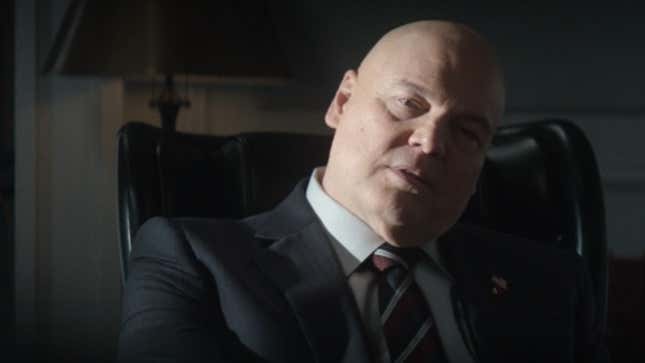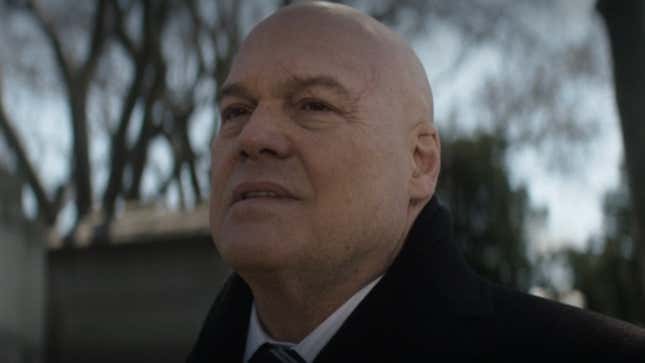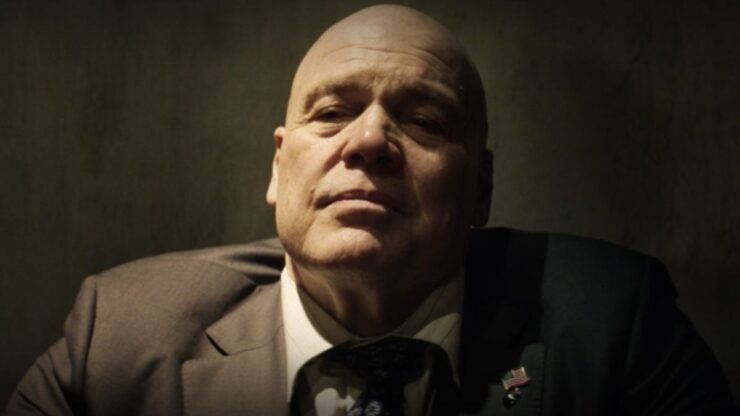Daredevil: Born Again is really quite something. It feels like the first genuinely adult-focused project within the MCU, and its shocking brutality is all the more surprising for being created by Disney. (While Deadpool & Wolverine had gore and naughty words, it’s hard to really credit the silly movie with being “adult.”) It’s not just Born Again’s visceral combat and ferocious language but also its thematic concerns as the inexorable pull of violence condemns its leads, all delivered with whip-smart writing and meticulous subtlety. But one thing it isn’t is an allegory for the re-rise of Donald Trump.
(Note on spoilers: I’ve deliberately written this not to spoil any significant story beats in the show, including the widely discussed major events from the first episode, but I obviously have to cover generalities.)
Daredevil: Born Again (DBA) is now six episodes into its run of nine, Disney+ adding two new episodes this week, and while it’s fair to say it’s suffering from that perennial Marvel TV issue of trying to stretch too little story across its run, it’s utterly compelling television.
As lawyer Matt Murdock aka Daredevil, Charlie Cox has developed his performance from the earlier Netflix seasons to something far subtler, exuding this extraordinarily purposeful quietness, the composure that allows his superheroic fighting abilities channeled into his speech. Whether convincing a jury in court or calmly establishing authority during a bank robbery, he neither performatively whispers nor shouts, but instead maintains a timbre that’s just quiet enough that people are forced to listen. It’s spellbinding.
Meanwhile, human chameleon Vincent D’Onofrio returns to the role of Wilson Fisk, aka Kingpin, with a similarly more moderate tone, without losing any of the power or fear that he commands. Fisk, who was seriously injured in sibling MCU TV show Hawkeye, returns to New York to attempt to pivot to politics, at the same time learning that his marriage is in serious trouble, and his control over the city’s crime is in tatters. Everything that stabilizes him, gives him the certainty of power he requires, is threatened, and yet D’Onofrio and the creative team behind the show have the wisdom to underplay this magnificently. We know he’s quiet-quiet-quiet before exploding, that’s his nature, but this time the rumbling feels so much more unnerving, and the contained explosions so much darker.
One of the core plots of the first season of DBA is Fisk becoming the mayor of New York, and the sometimes comic, sometimes abhorrent conflicts this raises for a man more used to performing his corruption and violence in the open. This known criminal, this man people know was Kingpin, takes a populist position in a politically fraught city to gain political power, but then realizes his victory brings with it a requirement to perform the expected role. And in this, many have reasonably leapt to draw the obvious similarity between this and Donald Trump’s being president. A known criminal who has been openly corrupt for decades gaining political power. It seems clear.
As a result, multiple reviews and opinion pieces have been written drawing out the common themes, many praising Disney’s boldness in addressing this face on, others condemning it for being too easy. But, while it absolutely had to be on the minds of the writers and producers, I’m not at all convinced that there was any desire for this text to be a piece of commentary or satire on this matter. It falls down in such a significant way that, if it were intentional commentary, would suggest an ignorance on the part of the creators that isn’t evidenced anywhere else in the show: Fisk isn’t an idiot.

It’s worth noting immediately that Daredevil: Born Again showrunner Dario Scardapane has already denied the allegory, albeit for the somewhat tenuous reason that the script was already written and the show mostly filmed “long before” 2024. (Those with long memories will remember Trump was president once before.) In a video interview with IGN (that is packed with spoilers), Scardapane explains that Fisk’s ability to win an election despite his widely known criminal past is largely to do with New York’s turning on superheroes, and Fisk’s figurehead position as a person of power promising to stand against them. If anything, it was his legitimacy as a dangerous man of enormously cunning influence that gave him the edge. And those really aren’t words that sensibly apply to Trump.
While I am skeptical of Scardapane’s claims that he didn’t consider Trump’s original rise to power at all, instead saying it was simply the continuation of a plot written by others in 2016, I do genuinely believe that he’s smart enough to know a person as intelligent and conniving as Fisk couldn’t be a meaningful allegory, and smart enough not to say that in an interview.
But without the words of the author, it’s plain to see. Daredevil: Born Again is a series about two men desperately fighting not to put their masks back on. That’s the core of everything that happens, every strand of plot we see. It is a show about two addicts doing everything they can to overcome their urges, while the world around them is doing everything it can to force them back down. Both are desperately clever men, blessed with everything they need to succeed in their respective fields, and yet beholden to an alter-ego that not only affords them shortcuts to all their goals, but satisfies a dark, awful bloodlust that lies within them.
Trump is just an idiot. I don’t say that to be “controversial” or because I think I’m making some exciting and provocative claim. It’s just dully and demonstrably true. He’s a stupid man for whom the storms converged, driven by populism on an instinctive, lizard-brained level, able to use his ill-gotten wealth to let him ride a wave of (woefully ironic) anti-authority milieu at the same time as the international Overton window lurched violently to the right.
Trump is a man who thinks that Ukraine sits on a trove of “raw earth,” and believes that human bodies begin life with a fixed reserve of energy. I realize Fisk is a fictional character, but I still struggle to imagine anyone writing him would have him describe a hurricane as “one of the wettest we’ve ever seen, from the standpoint of water.” It would also be a rather incongruous piece of storytelling for Kingpin to declare that George Washington’s army “took over airports.”

The key similarity between the two figures is that both use misguided prejudice in the populace to gain power. The difference is, one is being mendacious and manipulative, while the other just says stuff out loud and then latches on to the comments that get the loudest cheers. Fisk recognizes that following the atrocities that have visited New York since the advent of superheroes, he can exploit the anti-hero rhetoric to his own ends, given his own self-motivated reasons to have those who might stop his crime eliminated. Trump recognizes that his base cheers louder when he says he’s against abortion rather than for it, so switches to that view accordingly. One is directive, one is reactive. One is smart, one is dumb.
As such, reading Daredevil: Born Again as a satirical reaction to Trump’s presidency relies on assuming the creative team behind the show are also stupid, too stupid to notice any of the above. And they’re clearly not! And that’s largely demonstrated in just how little of the program is occupied by exploring the means by which Fisk was able to become mayor. DBA is far more fixated on far more interesting things, most especially how Fisk can suppress his alter-ego in order to achieve his wider aims—something that makes the reveal at the end of episode five so much more interesting than simply, “Oh, what a scamp!” Instead, it demonstrates the externalizing of his basest needs, literally taking prisoner his all-consuming need for harm and vengeance. If a Trump allegory were desired, he’d instead just be using his spare time looking around going “Doy doy” and watching TV.
.
Source link










Add comment